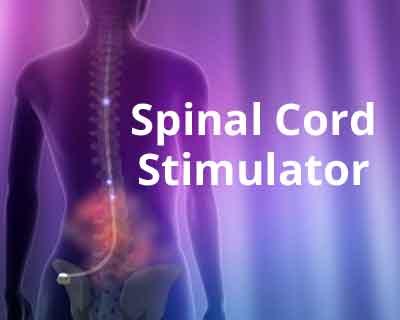- Home
- Editorial
- News
- Practice Guidelines
- Anesthesiology Guidelines
- Cancer Guidelines
- Cardiac Sciences Guidelines
- Critical Care Guidelines
- Dentistry Guidelines
- Dermatology Guidelines
- Diabetes and Endo Guidelines
- Diagnostics Guidelines
- ENT Guidelines
- Featured Practice Guidelines
- Gastroenterology Guidelines
- Geriatrics Guidelines
- Medicine Guidelines
- Nephrology Guidelines
- Neurosciences Guidelines
- Obs and Gynae Guidelines
- Ophthalmology Guidelines
- Orthopaedics Guidelines
- Paediatrics Guidelines
- Psychiatry Guidelines
- Pulmonology Guidelines
- Radiology Guidelines
- Surgery Guidelines
- Urology Guidelines
Novel Spinal Cord stimulation system beats medicines for intractable spine and limb pain

Data from two clinical studies of a novel spinal cord stimulation system developed in Australia by Saluda Medical Pty Ltd has been released by the company. In patients with intractable spine and limb pain, spinal stimulation (SS), particularly with newer technologies, was associated with better pain relief than medical therapy release data revealed.
The system, called Evoke ECAP-Controlled, Closed-Loop Spinal Cord Stimulation (SCS) System, is, according to the manufacturer, the first closed-loop SCS system to measure the spinal cord’s response to stimulation using evoked compound action potentials—ECAPs—and it adjusts on every pulse.
Steven M. Falowski, M.D., director of Functional Neurosurgery at Neurosurgical Associates of Lancaster in Lancaster, Pennsylvania, and investigator in the U.S. Evoke Study explained more about both the study and the uniqueness of the Evoke SCS system: “With each innovation in our field we are beginning to understand better the mechanism of action of SCS for the treatment of pain. We, as neurosurgeons, like to understand how the therapy we are using functions and with SCS, it has previously been a black box. The Evoke Closed-Loop SCS System is significant because it provides for the first time the opportunity to understand how the measurement of activation of the spinal cord can improve outcomes.”
According to Saluda Medical, this is the first double-blind randomized clinical study for a spinal cord stimulation product.
Also according to the company, at three-months follow up in the study, the Evoke SCS system met all pre-specified endpoints and demonstrated statistically superior back and leg pain relief (with no increase in pain medications) compared to control with more than 80% (82.3% of closed-loop subjects achieving greater than or equal to 50% pain relief versus control where 60.3% of the study subjects achieved greater than or equal to 50% pain relief).
At 18-month follow-up (the Avalon Australian Study) the investigators reported:
- 69.4% of patients experienced more than 80% pain relief.
- 83.3% experienced a clinically meaningful improvement in the quality of life.
- 67.9% reduced or eliminated opioid medications.
“For most surgeons, we are used to working with evoked responses as a safety tool. We are now using evoked compound action potentials to not only confirm we are delivering therapeutic energy to the spinal cord but using it to close a control loop to manage long-term pain relief.”
As such, we can cater the stimulation for the most ideal response, compared to open-loop SCS where there is no measure of response and we remain in the dark in understanding if the stimulation is actually providing therapy. Saluda designed its closed-loop system to measure the response to stimulation and adjust on every pulse to maintain activation within the patient’s individual therapeutic window, where we believe the stimulation is most effective at treating pain.”
“This system represents a potentially new and very exciting option for patients with chronic pain. It is currently under investigation in the U.S. and is not on the market, but the results that have been presented publicly are truly significant.”
“The Saluda US Evoke study at 3 months represents the best data available to date. In addition, from the Australian Avalon single-arm study out to 18 months initial pain relief has continued out to 18 months, and in some patients, pain relief is getting better over time, which is not typical with open-loop systems.”
Dr. Falowski emphasized the importance of treating both the patient’s pain and functionality. “With Evoke, quality of life improved across the board and disability reduction also showed significant improvement. So, with Evoke, we are treating patient’s pain scores and also their functionality in life to get them back to their lives, effectively generating important functional outcomes to match pain relief.”
“I would also like to add that the Evoke system could have additional benefits with regard to the opioid epidemic in the U.S. The Avalon study showed that more than 2 out of 3 patients reduced or eliminated their opioid medications by 18 months. Given this, Evoke could represent a great alternative to opioid medication for pain management. Saluda’s Closed-Loop SCS System marks the future of improvements in SCS.”

Disclaimer: This site is primarily intended for healthcare professionals. Any content/information on this website does not replace the advice of medical and/or health professionals and should not be construed as medical/diagnostic advice/endorsement or prescription. Use of this site is subject to our terms of use, privacy policy, advertisement policy. © 2020 Minerva Medical Treatment Pvt Ltd